Facilities
Science Centre
Our £30 million Science Centre in Stoke-on-Trent contains specialist laboratories with the latest state-of-the-art equipment.
Criminalistics Laboratory
Our Criminalistics Laboratory contains an array of equipment that will take you from crime scene to courtroom, giving you the ability to analyse and investigate the evidence which forms the backbone of prosecution and defence cases.
Analytical Laboratory
Our Analytical Laboratory has a comprehensive range of instrumentation for chemical analysis including chromatography, electrochemistry, molecular and atomic spectroscopy.
Mock Court Room
Our Mock Court Room give students the opportunity to present their evidence in a court room setting. This facility is invaluable in preparing students pursuing a career in forensic science or forensic investigation.
Libraries
We have libraries and service desks at both sites in Stoke-on-Trent and Stafford. Our experienced and friendly staff can answer your IT queries, help you to access resources, show you how to research for your assignments and help with referencing.
Lifelike Living Space
The Lifelike Living Space in Ashley 2 lets you practice your skills in evidence documentation and collection in a variety of non-clinical settings, including lounge, bedroom, bathroom, and bedsit.
Custody Suite
The Custody Suite in Ashley 2 has a front desk where suspects are booked in after arrest and is used during practical tasks.
Prison Cell
With its single bed and toilet, this space can be arranged as a holding cell for detainees. The Prison Cell allow students to practice offender management techniques. This room may also be used as a long-term prison cell.
Shop Simulation Space
The Shop Simulation Space is used for simulated commercial crime scenes, where students can document and collect evidence, and speak to witnesses or victims.
Office Simulation Space
The Office Simulation Space contains computers and desks, making it ideal for students’ digital forensic investigations.
Outdoor Simulation Space
The Outdoor Simulation Space is used for forensic investigations, such as examining vehicles after crashes or collecting evidence from a crime scene. It can also double up as a clinical simulation area, with space for our training ambulance.
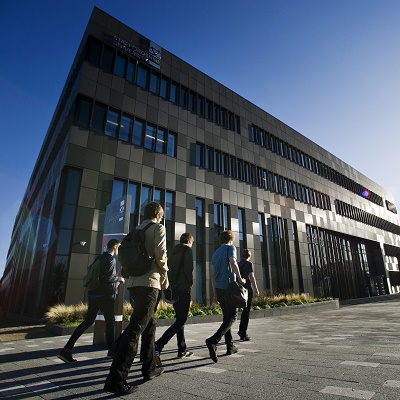
Science Centre
Our £30 million Science Centre in Stoke-on-Trent contains specialist laboratories with the latest state-of-the-art equipment. Read more
Find out more about our Science Centre Facilities.

The Criminalistics Laboratory
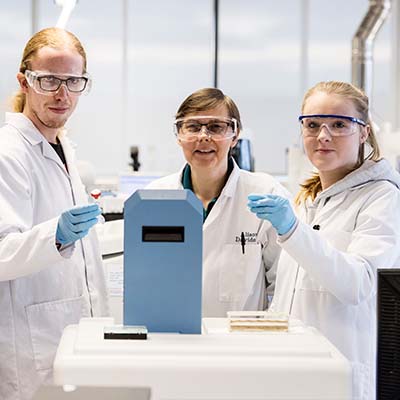
Analytical Laboratory
Our Analytical Methods Laboratory has a comprehensive range of instrumentation for chemical analysis including chromatography, electrochemistry, molecular and atomic spectroscopy.

Libraries
We have Libraries and service desks at both sites in Stoke-on-Trent and Stafford. Our experienced and friendly staff can answer your IT queries, help you to access resources, show you how to research for your assignments and help with referencing.

Lifelike living space
The lifellike living space in Ashley 2 lets you practice your skills in a variety of non-clinical settings, including bedroom, bathroom, lounge and bedsit. Read more
Bedrooms:
The bedroom has an en-suite bathroom and is used for simulated crime scenes where students can practise investigative skills or social work and healthcare can use the space for urgent situations and interviews.
Lounges:
The lounges have a homely feel, with comfy furniture and framed photos. Students can use these spaces for policing or forensic investigations. Social work and healthcare can also use the space for realistic interviews and clinical emergencies.
Bathroom:
The bathroom provides a lifelike backdrop for students to practise their skills. It can be used a range of simulation scenarios, such as domestic crime scenes or clinical emergencies.
Bedsit:
With a kitchen diner, bedroom and bathroom, the bedsit provides a lifelike backdrop for students to practise their skills. Scenarios can range from gathering evidence at simulated crime scenes to dealing with clinical emergencies.
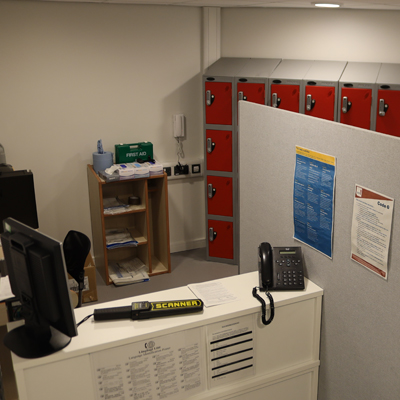
Custody suite
There is a front desk where suspects are booked in after arrest. Read more
Other features include equipment for measuring height and taking fingerprints and custody photos, along with evidence bags and lockers for personal belongings.
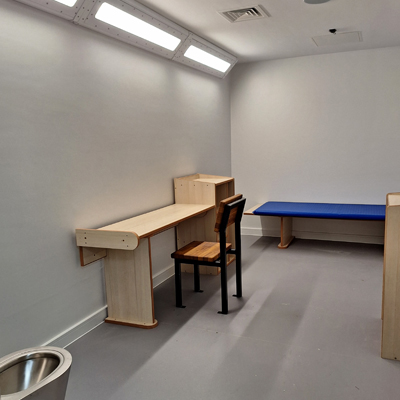
Prison cell
With its single bed and toilet, this space can be arranged as a holding cell for detainees. It’s where students can practise offender management techniques. The room can also be turned into a more long-term prison cell.
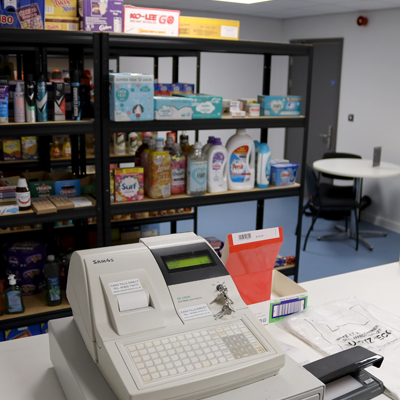
Shop simulation space
The is ideal for simulated commercial crime scenes, where students can collect evidence and speak to witnesses or victims. Read more
They can also learn about retail law and deal with medical emergencies that occur to customers in the retail space. The space includes shelves, a counter and a small café. It’s ideal for simulated commercial crime scenes, where students can collect evidence and speak to witnesses or victims. They can also learn about retail law and deal with medical emergencies that occur to customers in the retail space.
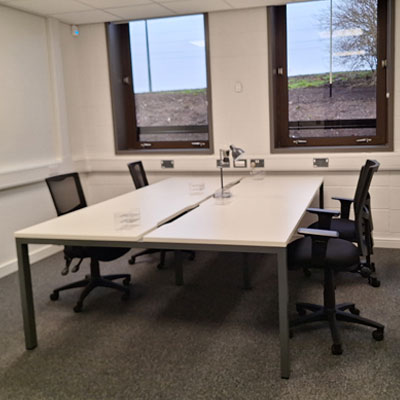
Office simulation space
The office space is kitted out with computers and desks, making it ideal for students’ digital forensic investigations. Read more
Students from a range of courses can also practise their interview skills using an appropriate scenario.
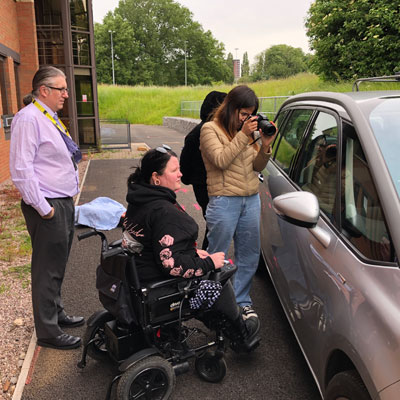
Outdoor simulation space
This area is used for forensic investigations, such as examining vehicles after crashes or collecting evidence from a crime scene. It can also double up as a clinical simulation area, with space for our training ambulance.